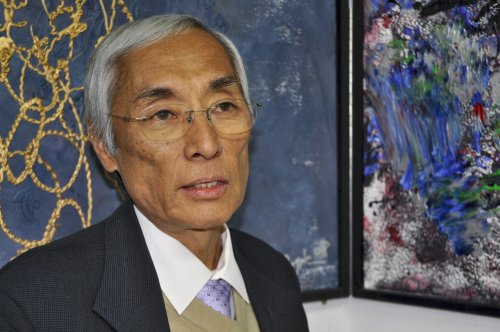Brazil wants a more give-and-take approach to trade with South Korea
Brazil’s ambassador is eliminating the word “complementary” from the lexicon of bilateral trade with Korea.
Instead, he uses the word “synergy” to explain the growth possibilities for both sides.
“Complementarity means that one side is making the food while the other is eating it. Synergy means that both sides can contribute to the common meal,” Edmundo Fujita told The Korea Herald.
Brazil’s main current objective is to improve social and economic development through a fair distribution of income and sustainable growth.
The main challenge, Fujita said, is to achieve these results through a balanced combination of biodiverse resources, technological innovation and non-predatory business practices to reduce internal imbalances and expand benefits.
Some of the promising areas for both sides are advanced technologies and biotechnologies, nanotechnologies, efficient energy supplies, green chemistry and new materials.
“Each side has advantages in one or another field and complements each other because one side might not be as developed as the other,” he noted.
Brazil’s ambassador is eliminating the word “complementary” from the lexicon of bilateral trade with Korea.
Instead, he uses the word “synergy” to explain the growth possibilities for both sides.
“Complementarity means that one side is making the food while the other is eating it. Synergy means that both sides can contribute to the common meal,” Edmundo Fujita told The Korea Herald.
Brazil’s main current objective is to improve social and economic development through a fair distribution of income and sustainable growth.
The main challenge, Fujita said, is to achieve these results through a balanced combination of biodiverse resources, technological innovation and non-predatory business practices to reduce internal imbalances and expand benefits.
Some of the promising areas for both sides are advanced technologies and biotechnologies, nanotechnologies, efficient energy supplies, green chemistry and new materials.
“Each side has advantages in one or another field and complements each other because one side might not be as developed as the other,” he noted.

Another phrase Fujita uses is the “bibimbap approach” for trade agreements instead of the famous spaghetti bowl effect which refers to the complications that occur when applying domestic rules of origin in free trade agreements. In the end, what happens is that a maze of regulations is created that only a trade lawyer could unravel.
“We prefer calling it the bibimbap approach,” he said. “You mix everything in a bowl and it makes a delicious dish, separately (the ingredients) are tasteless.”
“Putting everything in the mix would mean that one side will not be specially privileged over the other,” he said.
“The real problem that we have here in Korea is the same problem we have with Japan, that both countries are very protectionist in agriculture,” which makes it difficult for Brazil because it is one of the biggest exporters in agribusiness “and this is one of the main pillars for us at the Doha talks.”
Fujita’s main priorities while in Korea are to enhance business, innovation and technology.
“That’s why we are concentrating much more on these ideas than just traditional trade where we sell and buy like boxes. That doesn’t interest Brazil.”
Fujita would like to see a more give-and-take approach to trade with Brazil.
For example, to compensate for the sale of Korean electronics, automobiles and home appliances in Brazil, there would have to be more Brazilian agricultural products sold in Korea.
Brazil’s industrial sector voices strong opposition toward any form of free trade with Korea.
“If one industry loses a little bit then agriculture would gain a little bit. This would be the way to convince our people,” he said. “As long as Korea does not accept this kind of agreement, then there is nothing we could do.”
Brazil is a member of MERCOSUR, or the Southern Common Market.
As a bloc, MERCOSUR advocates that any agreement that eliminates trade barriers to Korea would have to be met with a liberal agricultural trading policy and with an increase of foreign direct investments of Korean manufacturing and industrial firms in any of the bloc’s member countries of Argentina, Brazil, Paraguay and Uruguay
Taking the headaches of FTAs out of the equation, another way of accentuating relations is to find the right combination of partners “which is the essence in achieving strategic qualitative jumps in the progress of nations.”
The embassy has been encouraging the adoption of a “2 plus 2” model of bilateral cooperation where enterprises and research and development institutes on both sides could establish joint projects.
“This kind of association could lead to innovative breakthroughs among the partners, improve energy efficiency with green-technologies, to educate and develop new capabilities for scientific resources in both countries, and to dynamize trade relations not only between both countries but also third markets,” he said.
Both countries already have convergent conditions for green growth and sustainable development.
“All they need now is to pass into action by means of concrete successful initiatives,” said Fujita.
By Yoav Cerralbo (yoav@heraldcorp.com)











![[From the Scene] Monks, Buddhists hail return of remains of Buddhas](http://res.heraldm.com/phpwas/restmb_idxmake.php?idx=644&simg=/content/image/2024/04/19/20240419050617_0.jpg&u=20240419175937)


![[From the Scene] Monks, Buddhists hail return of remains of Buddhas](http://res.heraldm.com/phpwas/restmb_idxmake.php?idx=652&simg=/content/image/2024/04/19/20240419050617_0.jpg&u=20240419175937)

![[KH Explains] Hyundai's full hybrid edge to pay off amid slow transition to pure EVs](http://res.heraldm.com/phpwas/restmb_idxmake.php?idx=652&simg=/content/image/2024/04/18/20240418050645_0.jpg&u=20240419100350)

![[Today’s K-pop] Illit drops debut single remix](http://res.heraldm.com/phpwas/restmb_idxmake.php?idx=642&simg=/content/image/2024/04/19/20240419050612_0.jpg&u=)